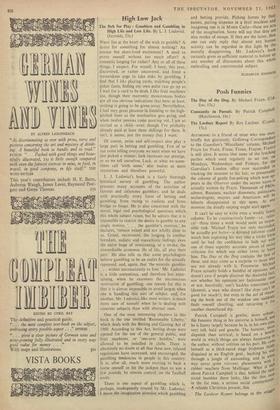High Low Jack
The Itch for Play : Gamblers and Gambling in High Life and Low Life. By L. J. Ludovici. (Jarrolds, 25s.)
WHAT lies at the heart of the wish to gamble? A desire for something for almost nothing? An intense but short-lived excitement? A need to prove oneself without too much effort? A romantic longing for riches? Any or all of these things, I suspect. For myself, I have, this year, discovered, or rather uncovered, and freed a tremendous urge to take risks by gambling. I find that I like playing cards, watching people's poker faces, feeling my own pulse rate go up as I wait for a card to be dealt. I like fruit machines too, though their matronly, monotonous bodies are all too obvious indications that here, at least, nothing is going to be given away. Nevertheless, I feel very great pleasure in listening to the high- pitched buzz as the mechanism gets going, and when twelve pennies come pouring out, I am as excited as a child—even though I've probably already paid at least three shillings for them. It isn't, it seems, just the money that I want.
Of course, pride and self-respect also play a large part in betting and gambling. Few of us can resist telling everyone we meet when we have just picked a winner; luck increases our prestige, or so we tell ourselves. Luck, or what we some- times call 'sixth sense,' also makes us seem mysterious and therefore powerful.
L. J. Ludovici's book is a fairly thorough historical survey of gambling. The author presents many accounts of the activities of famous and infamous gamblers, and he deals with practically every form of betting and gambling, from racing to roulette and from bridge to bingo. He is also concerned with the moral, legal and psychological questions which this whole subject raises, but he admits that it is impossible to restrict the desire to gamble to,any single motive; `. . the gambler's motives,' he declares, 'remain mixed and not wholly clear to us. Greed, excitement, -the longing to combat boredom, sadistic and masochistic feelings, even the naïve hope of overcoming, at a stroke, the irremediable economic ills of life, all play their part.' He also tells us that some psychologists believe gambling to be an outlet for the sexually repressed, and, again, that 'the neurotic gambler . wishes unconsciously to lose.' Mr. Ludovici is a little sententious, and therefore less enter- taining, when he examines the unconscious motivation of gambling; one reason for this is that it is almost impossible to avoid jargon when one is handling this sort of subject, and, for another, Mr. Ludovici, like most writers, is much more sure of himself when he is dealing with concrete subjects than with abstract ones.
One of the most interesting chapters in this book is the one entitled 'Reasonable Liberty,' which deals with the Betting and Gaming Act of 1960. According to this Act, betting shops were opened for the use of the general public, and fruit machines, or 'one-arm bandits,' were allowed to be installed in clubs. There is absolutely no doubt at all that these new, relaxed regulations have increased, and encouraged, the gambling tendencies in people in this country. It is, after all, much more exciting to back a horse oneself or hit the jackpot than to win a few pounds, by remote control, on the football pools.
There is one aspect of gambling which is, perhaps, inadequately treated by Mr. Ludovici; I mean the imaginative stimulus which gambling
and betting provide. Picking horses by their names, putting sixpence in a fruit machine and imagining one is in Monte Carlo—these are acts of the imagination. Some will say that they are also modes of escape. If they are the latter, then one can only reply that almost any human activity can be regarded in this light by the morally disapproving. Mr. Ludovici's book certainly gives us sufficient material to bolster 1.1P any number of discussions about this whole enthralling and controversial subject.
ELIZABETH JENNINGS










































































 Previous page
Previous page